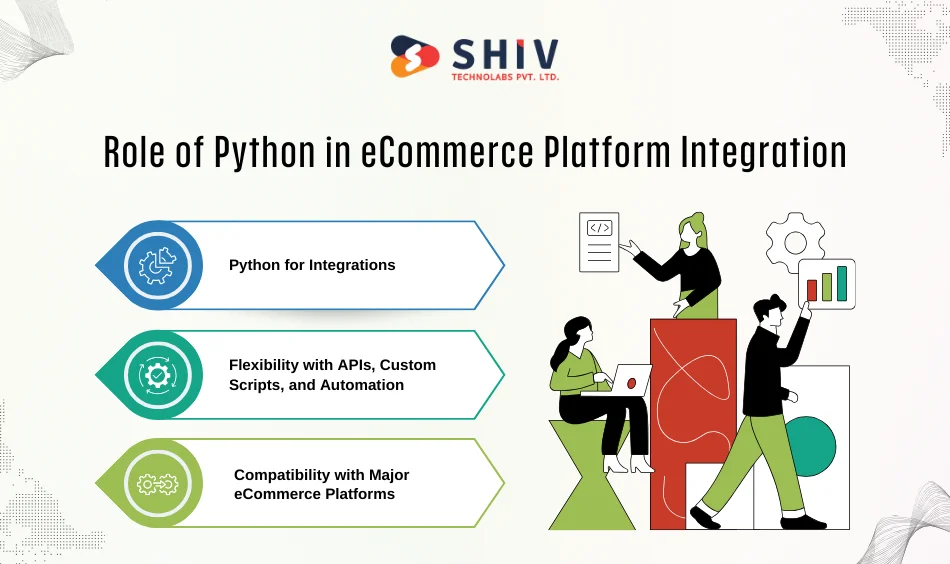Table of Contents
Online shopping now makes up more than 20% of all retail sales worldwide, and this number keeps growing. Integration has become the backbone that keeps eCommerce businesses running smoothly. Today’s companies operate in rapidly evolving digital spaces where customer orders originate from multiple selling channels, money is processed immediately, and stock levels require instant updates. When systems don’t connect properly, online shops encounter issues such as separated tools, redundant manual tasks, and prolonged waiting times that frustrate customers.
Python eCommerce integration comes to help with its flexible nature. People know this programming language for being easy to adapt, having a clear code structure, and offering many helpful libraries.
Python is well-suited for integrating eCommerce websites with payment systems, customer management tools, business software, and other critical applications. When Python developers for eCommerce projects take care of connecting systems, companies get better workflows, correct data matching, and easier daily work.
Why eCommerce Businesses Need System Integration
Having all systems work together is not something nice to have for today’s online stores. It is something they must have to keep operations running well and customers happy.
Problems with Disconnected eCommerce Platforms
When systems don’t connect, companies have to jump between many different screens to change inventory numbers, check orders, handle payments, and manage shipping. This leads to mistakes made by people, incorrect stock numbers, and lost orders, ultimately affecting the business’s profitability.
Speed, Accuracy, Better Customer Experience
Connecting systems with Python eCommerce integration enables companies to sync their data automatically. This makes processing faster, keeps stock counts right, and makes customers happier by giving them live order tracking and quicker delivery.
Automation Saves Time and Resources
Using automation through Python development for online stores eliminates the need to re-enter the same information repeatedly. Workers can focus on important tasks, such as marketing, customer engagement, and product development, rather than performing unnecessary manual labour.
Role of Python in eCommerce Platform Integration

Python has grown into one of the top choices for eCommerce integration work because it can adapt well and handle growth.
Python for Integrations
Python developers for eCommerce pick this language because it is simple to use, has many available libraries, and can connect with almost any software setup. It works especially well for connecting through APIs and moving large amounts of data.
Flexibility with APIs, Custom Scripts, and Automation
Python can talk to nearly any eCommerce platform or outside service, whether using REST or GraphQL APIs. Developers have the opportunity to set up special scripts, which will synchronize data, generate reports, process orders automatically.
Compatibility with Major eCommerce Platforms
Integration with eCommerce platforms such as Shopify, Magento, WooCommerce, and BigCommerce is also easy to integrate into Python API. It is an indication that organizations are free to use the channel that suits them without having to worry about connectivity issues.
Common Integration Scenarios Python Developers Handle
Python developers for eCommerce projects work on many different types of connections based on what each business needs.
Payment Gateway Integrations
The Python eCommerce integration ensures that the transactions are secure and fast, especially when using Stripe, PayPal, or even local payment services.
Inventory and Order Management Systems
Integrating live inventory is a solution that prevents businesses that oversell because it ensures that the availability of the products being sold will always be accurate on every selling platform.
CRM and Marketing Tool Connections
In the case of online stores, Python development can be used to connect customer management tools such as HubSpot or Salesforce to the online store thereby assisting with improved customer targeting and follow up messages.
Marketplace Integrations (Amazon, eBay, Etsy)
When businesses sell on multiple marketplaces, Python API integration eCommerce solutions can bring all sales information together in one place for easier handling.
Step-by-Step Process of eCommerce Integration with Python
Python developers use an organized method to make sure connections work smoothly and reliably.
Understanding Business Requirements
The job begins with a close examination of how systems are currently operating, how they should be linked and what information should flow between systems.
Choosing the Right Integration Method
Developers decide if API connections, middleware tools, or direct database links will give the most stable integration.
Development and Testing
Special scripts and connectors get built to create communication between systems. Careful testing makes sure there are no data problems or mistakes.
Deployment with Minimal Downtime
Python developers for eCommerce try to put new integrations in place during quiet times to avoid stopping customer transactions.
Post-Integration Monitoring
Once installed, systems are closely monitored to ensure that there is a correct movement of the data and issues are corrected on a timely basis.
Benefits of Using Python for eCommerce Integrations

When using Python eCommerce integration, businesses have operational as well as commercial benefits.
Faster Development and Deployment
The readable python code structure with a vast number of libraries assistance allows developers to create and begin integrations faster than most other programming languages.
Secure Data Transfer
Python also includes functions to encrypt and verify data and makes sensitive customer and payment data secure.
Scalability for Growing Product Catalogs
As the companies introduce additional products or start to sell in other channels, Python-based connections can be expanded without requiring wholesale reconstruction.
Automation of Repetitive Tasks
Python scripts are useful to automate repetitive tasks such as order confirmations and stock updates and save hundreds of working hours per year.
Enhanced Reporting and Analytics
Python development for online stores can connect advanced analysis tools, changing raw sales numbers into useful business insights.
Key Skills to Look for in Python Developers for eCommerce Projects
To ensure a successful integration, you should recruit expert Python developers who are familiar with the correct systems.
| Skill | Why It Matters |
|---|---|
| Experience with eCommerce APIs (Shopify API, WooCommerce REST API) | Makes sure platforms can talk to each other smoothly |
| Knowledge of payment gateway APIs (Stripe, PayPal) | Helps create safe and fast transactions |
| Understanding of ERP/CRM systems | Allows better business data synchronization |
| Data security best practices | Keeps sensitive customer and business information protected |
How to Ensure Smooth Operations After Integration
Integration does not mean doing something one time and moving on. Ongoing upgrades must be introduced so that everything runs smoothly.
Testing Across All Connected Systems
Frequent testing ensures that updates in any of the platforms do not screw up data delivery in the rest.
Setting Up Automated Alerts for Errors
Alerts inform the teams immediately when there is a failure within a sync of an order, something that avoids delays in delivering the products to the customers.
Continuous Performance Monitoring
Observing the speed at which data travels, the responsiveness of APIs and the frequency of inaccuracies can ensure that everything is smooth.
Staff Training on New Workflows
Workers need training to understand how connected systems work so they can fix problems quickly.
Trends in Python-Based eCommerce Integrations for 2025
The future of eCommerce integration with Python focuses on smart features, automation, and selling through multiple channels.
AI-Powered Personalization and Recommendations
Python developers for eCommerce are adding AI systems that suggest products based on what each customer likes.
Chatbot and Customer Service Automation
Python scripts now connect chatbots straight to order databases, letting them answer customer questions instantly.
Predictive Inventory Management
By looking at past sales and market patterns, Python integration can help predict what customers will want and prevent having too much stock.
Multi-Channel Synchronization
Python API integration eCommerce solutions will focus more on syncing data across online stores, marketplaces, and physical shops in real time.
Conclusion
Connecting eCommerce platforms with Python makes operations smoother, improves accuracy, and makes customers happier. By linking payment systems, customer management tools, business software, and marketplaces, Python developers build unified systems that save time and cut costs.
For businesses that want to set up complex connections, having the right team matters a lot. Working with experts ensures that every connection remains stable, secure, and capable of growth. Shiv Technolabs is a hub of Python experts and brilliant tech minds helping to connect eCommerce platform with Python. We specialise in Python eCommerce integration, delivering tailored solutions to ensure your online store operates smoothly. If you want to connect your platform with multiple systems efficiently, it is time to hire dedicated Python developers who can make your ideas real.
Let us change your separate tools into one powerful system for growth. From custom API connections to complete automation, Shiv Technolabs creates solutions that make your eCommerce platform work better for you.






















